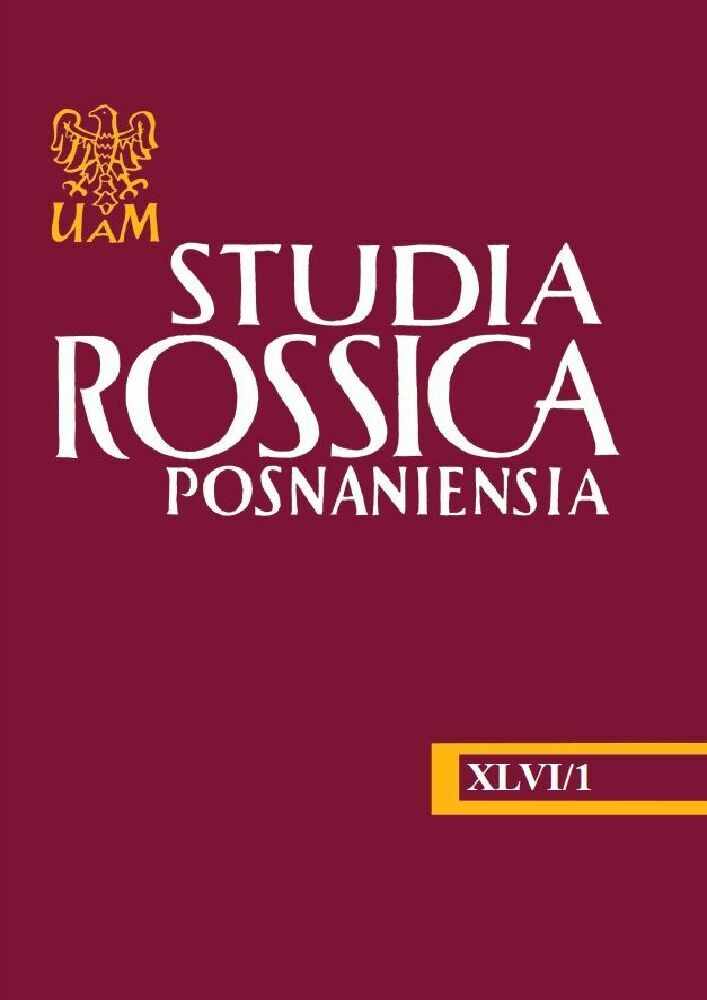Abstrakt
In his works Mikhail Zoshchenko presented a brilliant sense of the common language which developed in Russia after the revolution of 1917, i.e. in a period of turbulent political changes and numerous social contradictions. The phenomenon of this writer is based on the constant interest of both readers and researchers in the specific language of his works. This is reflected in numerous statements by Zoshchenko’s characters. In their responses, dialogues and monologues there are a number of orthoepic, spelling, grammatical, word-forming, semantic, stylistic and syntactic deficiencies. The deviations concern the principles of inflection, declination, generic belonging, an illogical and non-normative expression relationships. The issues above are analysed in the present article. In Zoshchenko’s works, along with normative language, there coexist phenomena that are far from literary standards. His texts reflect the spoken language, which, like real communication, differs much from the normalized literary language. In order to show the spiritual and moral transformation of a man, Zoshchenko revealed and judged various distortions and defects in the post-revolutionary life of Russia. The writer chose for this short forms of narration – the short story, a tale, a sketch, a humoresque. The language of Zoshchenko’s works is characterized by the crossing of various semantic and stylistic structures. In one context, inherently incompatible words and expressions are combined. This technique generates many semantic and stylistic shifts. In fact, Zoshchenko reflected the language that was spoken by many people in the post-revolutionary period. The writer tried to represent much of the speech of that time and use it humorously.
Bibliografia
Âhiâeva, Saidat Hizbulaevna. „Rolʹi funkciâ «govorâŝih» familij v proizvedeniâh M. Zoŝenko”. Vestnik Dagestanskogo gosudarstvennogo universiteta, 4, 2014, s. 305–313.
Antonov, Sergej. „M. Zoŝenko. Stanovlenie stilâ”. Literaturnaâ učeba, 6, 1984, s. 203–213.
Astafʹev, Andrej. „Okkazionalizmy v rasskazah M. M. Zoŝenko”. Russkaâ rečʹ, 4, 2012, s. 25–26.
Aulov, Anatolij Mihajlovič. Rasskazy M. Zoŝenko 20-h godov. Problema žanra i stilâ: аvtoref. dis. kand. filol. nauk. Moskva, 1998.
Drawicz, Andrzej. „Moralista z powołania, humorysta mimo woli”. M. Zoszczenko. Punkt widzenia. Opowiadania i powieści. Warszawa, Czytelnik, 1985, s. 529–540.
Eršov, Leonid Fedorovič. Iz istorii sovetskoj satiry. M. Zoŝenko i satiričeskaâ proza 20-40-h godov. Leningrad, Nauka, 1973.
Isaeva, Larisa Abdurahmanovna. Kommunikativnyj i konnotativnyj aspekty knižnyh leksičeskih i frazeologičeskih edinic v hudožestvennyh tekstah (na materiale rasskazov M.M.Zoŝenko). Nazranʹ, Izdatelʹstvo Kep, 2012.
Jackiewicz, Mieczysław. „Elementy groteski w krótkich opowiadaniach Michaiła Zoszczenki”. Małe formy w literaturze rosyjskiej. Słowo w tekście rosyjskim. Literaturoznawstwo. Olsztyn, Wydawnictwa Wyższej Szkoły Pedagogicznej, 1991, s. 97–105.
Kotkiewicz, Aurelia. Nowy człowiek Michaiła Zoszczenki. Trylogia: „Przywrócona młodość”, „Niebieska księga”, „Przed wschodem słońca”. Kraków, Wydawnictwo Naukowe Uniwersytetu Pedagogicznego, 2012.
Kurošina, Zoâ Vladimirovna. „Problema čistoty russkogo âzyka v rasskaze M. Zoŝenko «Obezʹânin âzyk»”. Russkij âzyk v škole, 4, 2009, s. 43–46.
Lomova, Tatʹâna Mihajlovna. „Četyre uroka u Zoŝenko”. Literatura v škole, 7, 2013, s. 19–20.
Mucha, Wacław. Opowiadania satyryczne i humorystyczne Michaiła Zoszczenki (1921–1932). Z zagadnień poetyki i komunikacji literackiej. Wrocław–Warszawa–Kraków–Gdańsk–Łódź, Wydawnictwo Polskiej Akademii Nauk, 1985.
Pyykkö, Riitta. „Otraženie leksičeskih izmenenij poslerevolûcionnogo perioda v rasskazah Mihaila Zoŝenko”. Studia Slavica Finlandensia, 10, 1993, s. 119–131.
Ruben, Berngard Savelʹevič. Alibi Mihaila Zoŝenko. Moskva, Izdatelʹstvo Agraf, 2001.
Ŝerbakova, Polina Olegovna. „Soznanie «massovogo geroâ» i formy ego vyraženiâ v cikle M. Zoŝenko «Rasskazy Nazara Ilʹiča Gospodina Sinebrûhova»”. Vestnik Voronežskogo gosudarstvennogo universiteta. Seriâ Filologiâ. Žurnalistika, 1, 2013, s. 119–123.
Sinâvskij, Andrej. „Mify Mihaila Zoŝenko”. Voprosy literatury, 2, 1989, s. 50–67.
Tomaševskij, Ûrij Vladimirovič. „Pâtnadcatʹ minut iz žizni Muzy”. Stolica, 8, 1992, s. 61–62.
Vežbinʹski, Âroslav. „Inoâzyčnye vkrapleniâ v russkoj hudožestvennoj literature (na materiale proizvedenij Mihaila Zoŝenko)”. Beiträge zur Slavistik. Band 27: Innerslavischer und slavischdeutscher Sprachvergleich. Red. Herbert Jelitte, Tatʹâna Troškina. Frankfurt am Main–Berlin–Bern–New York–Paris–Wien, Peter Lang, 1995, s. 241–253.
Wierzbiński, Jarosław. „Illûziâ inostrannoj reči v strukture tekstov Mihaila Zoŝenko”. Studia Rossica Posnaniensia, 43, 2018, s. 315–326.
Zaharieva, Irina. „Rasskazy Mihaila Zoŝenko”. Bolgarskaâ rusistika, 1, 1989, s. 9–19.
Žolnina, Elena Vladimirovna. „Golubaâ kniga” M.M. Zoŝenko: tekst i kontekst: аvtoref. dis. kand. filol. nauk. Sankt-Peterburg, 2007.
Zoŝenko, Mihail. Sobranie sočinenij v treh tomah. Leningrad, Hudožestvennaâ literatura, 1986–1987.
Licencja
PRACE PUBLIKOWANE W CZASOPIŚMIE DOSTĘPNE SĄ NA LICENCJI CREATIVE COMMONS:
Uznanie autorstwa-Użycie niekomercyjne-Na tych samych warunkach 4.0 Międzynarodowe.
Autorzy tekstów przyjętych do publikacji w czasopiśmie „Studia Rossica Posnaniensia” są zobowiązani do wypełnienia, podpisania i odesłania na adres redakcji umowy o udzielenie nieodpłatnej licencji do utworów, z zobowiązaniem do udzielania sublicencji Creative Commons.
Zgodnie z umową, autorzy tekstów opublikowanych w czasopiśmie “Studia Rossica Posnaniensia” udzielają Uniwersytetowi im. Adama Mickiewicza w Poznaniu niewyłącznej i nieodpłatnej licencji oraz zezwalają na użycie sublicencji Attribution-NonCommercial-ShareAlike 4.0 International (CC BY-NC-SA 4.0).
Autorzy zachowują prawa do dalszego, swobodnego rozporządzania utworem.
Autorzy, którzy wykorzystują w swoim tekście cudze utwory (np. ilustracje, fotografie) proszeni są o dostarczenie do redakcji czasopisma zgody na publikację.
Użytkownicy internetu uprawnieni są do korzystania z utworów opublikowanych po 2015 roku “Studia Rossica Posnaniensia” tylko w celach niekomercyjnych, pod następującymi warunkami:
https://creativecommons.org/licenses/by-nc-sa/4.0/
Uniwersytet im. Adama Mickiewicza w Poznaniu zachowuje prawo do czasopisma jako całości (układ, forma graficzna, tytuł, projekt okładki, logo itp.).

